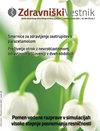INFLUENCE OF SPECIALISTIC TRAINING IN FAMILY MEDICINE ON DETECTION AND MANAGEMENT OF ETHICAL DILEMMAS
Q4 Medicine
引用次数: 2
Abstract
Background Ethical dilemmas are an important part of daily routine in family practice. One of the options for better quality in family practice is also an effective postgraduate education in the field of bioethics. We wanted to determine the influence of the specialization process on the susceptibility of family physicians to ethical dilemmas and their solving difficulty. We hypothesized that specialists in family medicine would detect the ethical dilemmas more often and that they would report of less problems in their managing. Methods The cross-sectional study included a random sample of 259 Slovenian family medicine physicians (30 % of the whole population of family physicians). Participants were given a self-administered questionnaire on perceived ethical dilemmas in family practice with responses on a 5-point scale and a maximum score of 100. Results In the final analysis 142 Slovenian family medicine physicians (55 % response rate) were included. Specialists in family medicine and residents of family medicine reported ethical dilemmas more often than their colleagues without specialization (37.0 ± 12.6 vs. 30.7 ± 10.8; P = 0.05). Similarly, the residents of family medicine reported ethical dilemmas more often than their colleagues without specialization (39.5 ± 12.5 vs. 30.7 ± 10.8, P = 0.04). Specialists in family medicine and residents of family medicine considered solving ethical dilemmas to be more difficult than their colleagues without specialization (57.3 ± 11.6 vs. 47.1 ± 11.8, P = 0.001). The same differences exist also between the specialists in family medicine and their colleagues without specialization (56.7 ± 11.7 vs. 47.1 ± 11.8, P = 0.003) and between the residents of family medicine and their colleagues without specialization (62.0 ± 10.0 vs. 47.1 ± 11.8, P = 0.001). Conclusions Physicians that are working in family practices need effective postgraduate education in the field of detection and management of ethical dilemmas. The questionnaire for perceived ethical dilemmas proved to be a reliable instrument for evaluation of education’s effectiveness.家庭医学专业培训对伦理困境发现和管理的影响
伦理困境是家庭实践中日常事务的重要组成部分。提高家庭医疗质量的途径之一是开展有效的生物伦理学研究生教育。我们想要确定专业化进程对家庭医生对伦理困境的易感性及其解决难度的影响。我们假设,家庭医学专家会更经常地发现道德困境,他们会报告较少的管理问题。方法横断面研究随机抽取259名斯洛文尼亚家庭医学医生(占家庭医生总人数的30%)。参与者被要求填写一份关于在家庭实践中感知到的道德困境的自我调查问卷,回答为5分,最高得分为100分。结果最终纳入142名斯洛文尼亚家庭医学医生(有效率55%)。家庭医学专家和家庭医学住院医师报告道德困境的频率高于非专科医师(37.0±12.6∶30.7±10.8;P = 0.05)。同样,家庭医学住院医师比非专科住院医师更常报告道德困境(39.5±12.5比30.7±10.8,P = 0.04)。家庭医学专科医师和家庭医学住院医师认为解决伦理困境的难度高于非专科医师(57.3±11.6∶47.1±11.8,P = 0.001)。家庭医学专科医师与非专科医师之间(56.7±11.7∶47.1±11.8,P = 0.003)和家庭医学住院医师与非专科医师之间(62.0±10.0∶47.1±11.8,P = 0.001)也存在相同的差异。结论家庭医生需要在伦理困境的发现和管理方面进行有效的研究生教育。认知道德困境问卷被证明是评估教育有效性的可靠工具。
本文章由计算机程序翻译,如有差异,请以英文原文为准。
求助全文
约1分钟内获得全文
求助全文

 求助内容:
求助内容: 应助结果提醒方式:
应助结果提醒方式:


